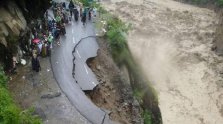
Jamaica is among five countries chosen by the World Food Programme (WFP) to serve as a model for the Caribbean in disaster response coordination.
The others are Belize, Dominica, Guyana, and St. Lucia.
WFP Head of Office for Barbados, Regis Chapman, made the disclosure while addressing the recent Shock-Responsive Social Protection in the Caribbean Regional Symposium in Providenciales, Turks and Caicos Islands.
He said that the WFP, along with international development consulting firm Oxford Policy Management “is developing five case studies in the Caribbean region… as part of our efforts to build evidence of shock-responsive social protection in the Caribbean.”
Speaking in an interview Chapman explained that the countries were selected “based on their level of linking social protection with disaster management”.
He said that Jamaica “is one of the more unique cases because of the history of linking social protection with humanitarian assistance. We actually chose Jamaica to serve as a model, particularly in the areas around coordination.”
Fieldwork for the case studies has been conducted and entailed interviews with government counterparts along with other stakeholders in the areas of social protection and disaster management; visits to communities; and meetings with beneficiaries of key social protection programmes.
“We are working with the ministry that oversees social protection and the ministry that oversees disaster management,” Chapman said.
“The idea is to share this evidence and look to see how we can link some of the experiences across the Caribbean, so that we can learn from each other and so that Caribbean countries can provide Caribbean solutions to Caribbean problems,” he noted.
Researchers are now analysing the data to submit, within a month, the findings and key recommendations to the governments of the respective countries for review.
The final case studies should be ready to be shared within the next three months.
Mr. Chapman said that Jamaica’s case study is also viewed “as a tool that the Government can use to look for gaps (and) how to go about addressing (them”.”
The Shock-Responsive Social Protection in the Caribbean Regional Symposium provides a platform for countries across the region to share their experiences and learn from each other.
It was hosted by WFP and the Caribbean Disaster Emergency Management Agency (CDEMA) in collaboration with the government of the Turks and Caicos Islands. The event brought together regional Ministers for social protection, disaster management and tourism, and Permanent Secretaries and Heads of disaster management agencies, to share information on how to protect and assist the poor and vulnerable locally and regionally, in order to build disaster resilience.
